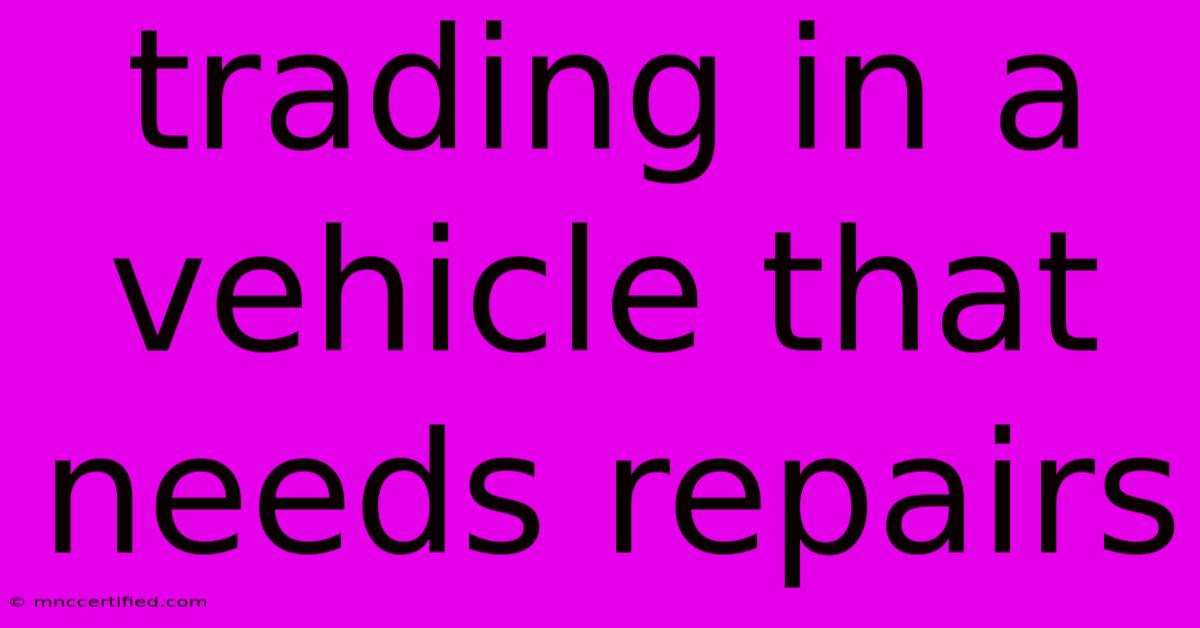Trading In A Vehicle That Needs Repairs

Table of Contents
Trading In A Car That Needs Repairs: What You Need To Know
You've decided it's time to get a new car, but your current vehicle has some issues. You're not alone! Many people find themselves in this position, and the decision of whether to trade in a car that needs repairs can be tricky.
This article will guide you through the process, outlining the factors to consider and the steps you need to take.
Should You Trade In A Car That Needs Repairs?
The answer to this question depends on several factors, including the severity of the repairs, the cost of the repairs, and the value of your current car. Here's a breakdown of the key considerations:
1. The Cost of Repairs vs. Potential Trade-In Value:
- If the repairs are minor and inexpensive: It might be worth fixing them and then trading in the car. This can help increase the trade-in value.
- If the repairs are significant and costly: It might be more economical to trade in the car "as-is." This means the dealership will likely deduct the repair costs from the trade-in value.
2. The Age and Condition of Your Car:
- Older cars with high mileage: Are generally worth less and might not be worth repairing.
- Newer cars with fewer miles: May be worth repairing, especially if the repairs are minor.
3. The Dealer's Willingness to Accept a Car with Issues:
- Some dealerships are more flexible: They may be willing to accept a car with repairs, even if they aren't minor.
- Other dealerships are more strict: They may not accept cars with significant repairs or may offer a much lower trade-in value.
Strategies for Trading in a Car Needing Repairs
1. Be Upfront with the Dealer:
- Disclose all known issues: Be transparent about any problems your car has, including the nature and severity of the repairs.
- Get a repair estimate: Provide the dealership with a repair estimate from a trusted mechanic. This can help support your claim about the cost of repairs.
2. Consider Repairing Minor Issues:
- Prioritize common repairs: Focus on fixing issues that significantly impact the vehicle's value and safety, such as engine problems, major electrical issues, or significant body damage.
- DIY repairs: If you have mechanical skills, consider tackling minor repairs yourself. This can save you money and potentially increase the trade-in value.
3. Explore Private Sale Options:
- Sell your car privately: You can potentially get a higher price than a trade-in, but it will require more effort and may involve negotiation.
- Online platforms: Websites like Craigslist, Facebook Marketplace, and AutoTrader can help you connect with potential buyers.
4. Negotiate the Trade-In Value:
- Research the market value: Use online tools like Kelley Blue Book or Edmunds to determine the fair market value of your car, both repaired and unrepaired.
- Be prepared to negotiate: The dealership will likely offer a lower trade-in value for a car with repairs. Be ready to negotiate a fair price based on the research you've done.
Tips for Getting the Best Trade-In Value:
- Clean your car thoroughly: This can make a positive first impression on potential buyers or the dealership.
- Have all necessary documentation: Including your vehicle title, registration, and service records.
- Be patient and persistent: It may take time to find a buyer who is willing to accept your car with repairs.
In Conclusion:
Trading in a car that needs repairs can be challenging, but with the right approach, you can navigate the process successfully. Weigh the cost of repairs against the potential trade-in value, and consider all your options before making a decision. Remember, transparency and preparation are key to getting a fair deal.

Thank you for visiting our website wich cover about Trading In A Vehicle That Needs Repairs. We hope the information provided has been useful to you. Feel free to contact us if you have any questions or need further assistance. See you next time and dont miss to bookmark.
Featured Posts
-
Health Insurance For Realtors In Texas
Nov 09, 2024
-
Warriors Fall Short Rangers Take Win
Nov 09, 2024
-
Marseille Fall To Auxerre 3 1 In Ligue 1
Nov 09, 2024
-
Redken Acidic Bonding Hair Falling Out
Nov 09, 2024
-
Scherzinger Apologizes Russell Brand Post Backlash
Nov 09, 2024